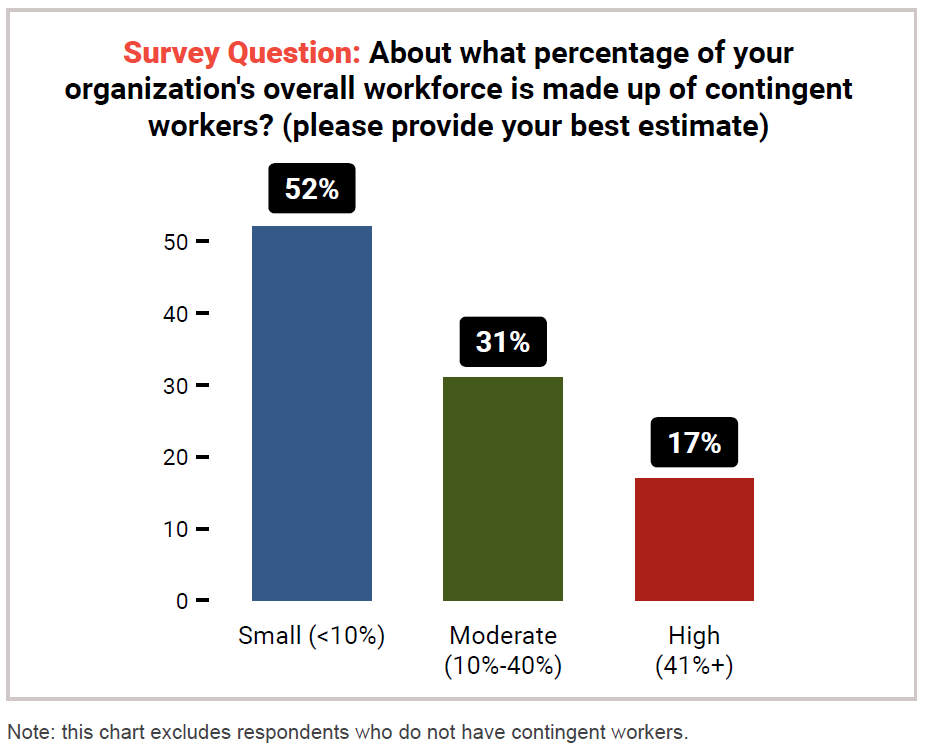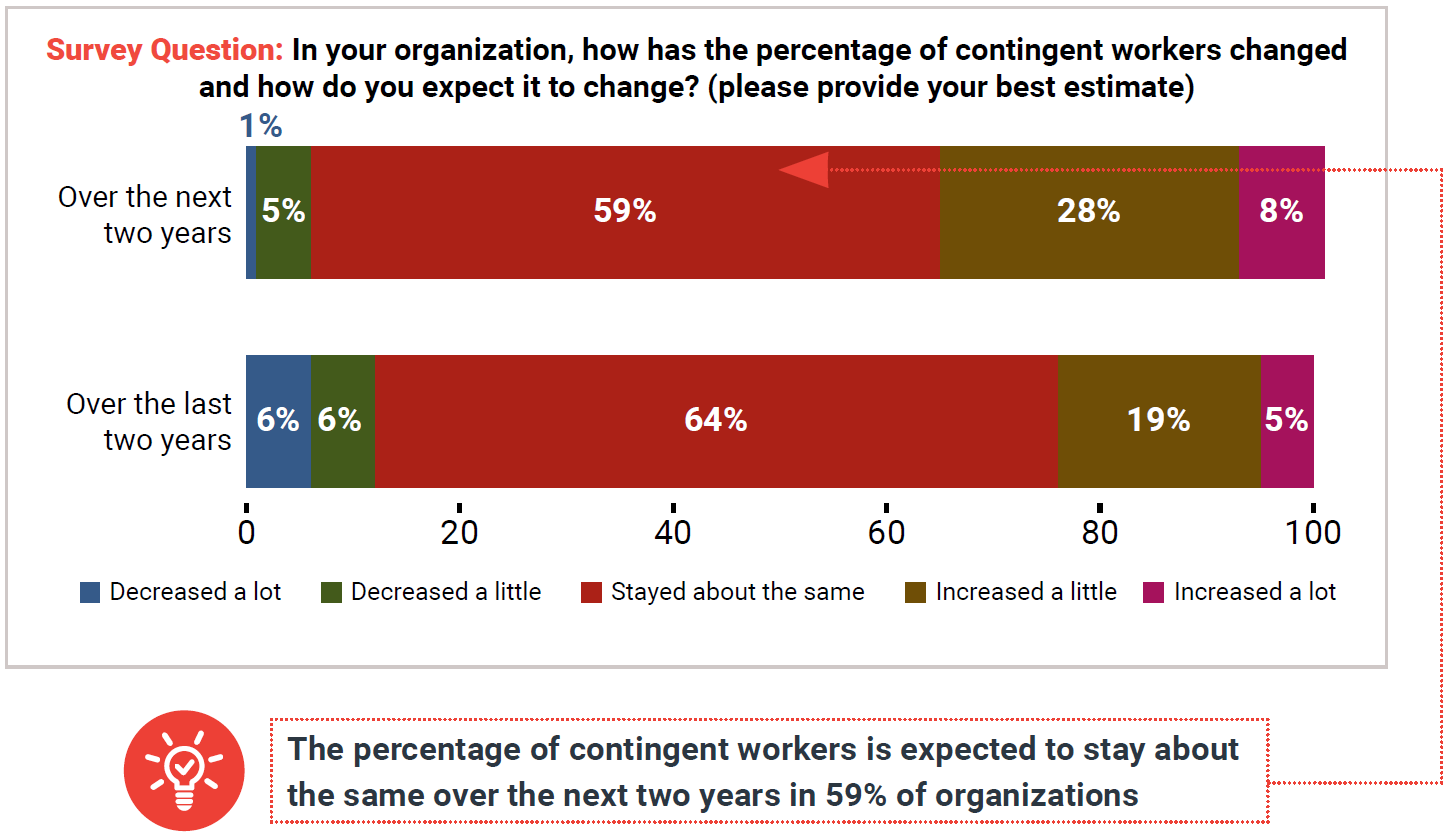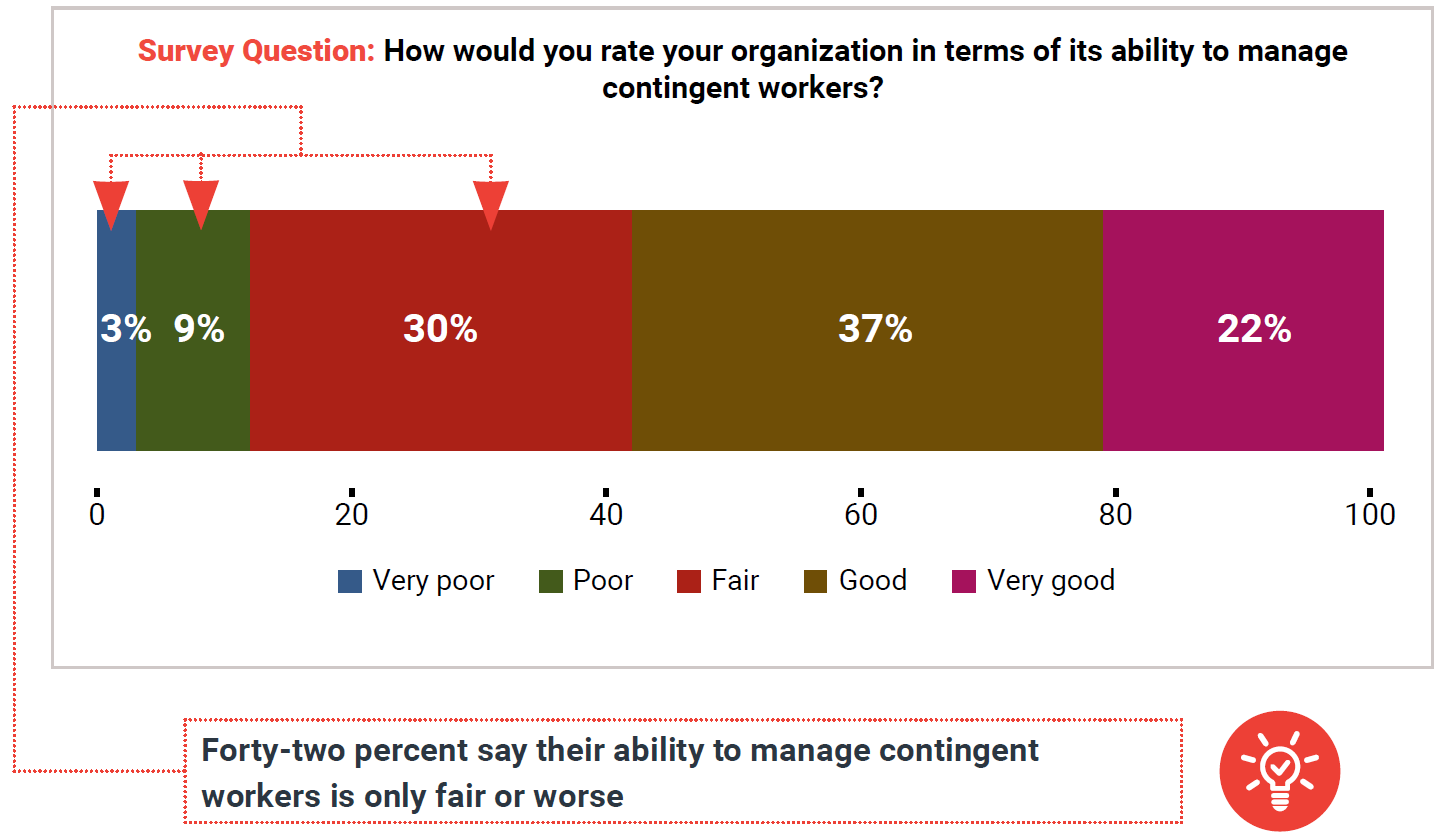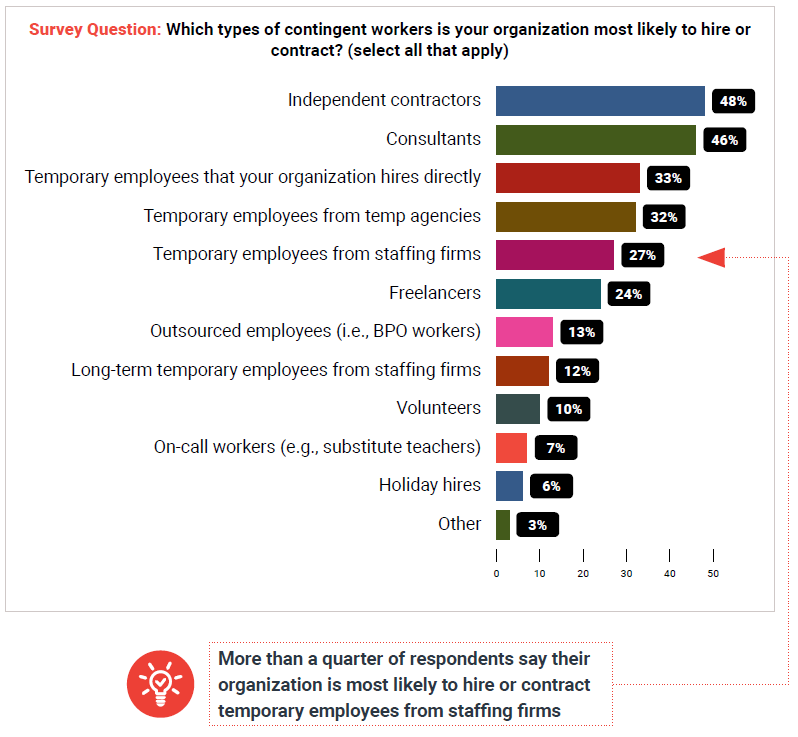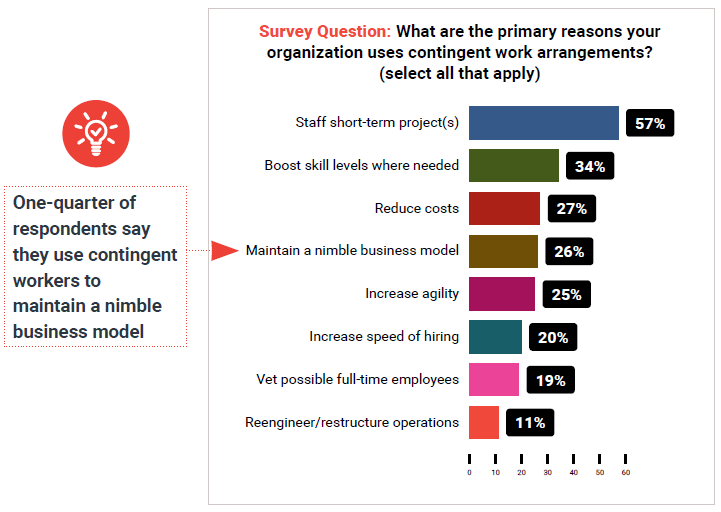In the survey, we presented respondents with the following definition: The term contingent work arrangement refers to any worker who is not viewed as a traditional full-time employee. Such workers may be freelancers, independent contractors, consultants, temporary employees, part-time employees, volunteers, or other outsourced and non-permanent workers.

Most organizations use contingent workers, but they are typically only a small percentage of the overall workforce
A large majority of organizations (81%) use contingent workers in their overall workforce. Of those that do use them, however, about half say just 1% to 10% of their workforce is made up of contingent workers. On the other hand, 17% say 41% or more of their workforce is made up of contingent workers, suggesting that nearly a fifth of organizations are highly dependent on such employees.
More than a third expect the percentage of contingent workers in their organization to increase over the next two years
While only 24% of organizations saw an increase in the proportion of contingent workers in the last two years, 36% expected the proportion to grow over the next two years. In a world filled with uncertainty, determining where contingent employees fit into workforce plans may be a worthwhile endeavor, especially for the organizations that are engaged in more project-based work.
Differences by size of organization
Nearly half (48%) of respondents in large organizations say that they expect the percentage of contingent workers to increase a little or a lot over the next two years. By comparison, just 35% of respondents in small and 25% of respondents in mid-sized firms say the same.
Just one-fifth of organizations are very good at managing contingent workers
Over half (59%) of responding HR professionals say their organization is good or very good at managing contingent workers. That still leaves, however, about two-fifths saying their organizations are only fair or worse at managing such employees.
Managing contingent workers can sometimes be challenging. There are security and legal risks as well as potential strains on corporate culture.
Consultants and independent contractors are the most commonly cited types of contingent workers
The term “contingent worker” covers a range of employment relationships. It includes everything from the classic “temp” to consultants to freelancers. Depending on their business needs, employers make use of a wide range of types of contingent workers. The two most common types (and the only ones selected by more than twofifths of respondents) are:
- independent contractors (48%)
- consultants (46%)
In our 2021 research, temporary employees hired directly by the organization topped the list at 41%. In our 2022 study, however, only 33% say this is the case.
HR professionals should keep in mind that there is a range of options for getting work done. They should choose the type of contingent worker that is best for the role and the organization, not just the first type that comes to mind.
More than half of respondents use contingent workers to staff short-term projects
There are many reasons an organization may choose to use contingent workers over traditional employees. The most common one is to staff short-term projects (57%). As we found earlier, about a third of respondents say that jobs will be redefined by being more project-based in the future. This flexibility allows organizations to invest in labor costs only when needed.
HR can play a role in educating managers in the many different uses of contingent staff. Managers may be inclined to ask for a new full-time employee when in fact a contingent worker would be a better fit for the organization’s needs.
HR professionals expect to see changes in employee attitudes, demographics, flexibility and skills over the next two years
We asked respondents to let us know how they expect employees to change over the next two years. In this open-ended survey question, they provided thoughtful responses on topics ranging from work arrangements to the overall employee experience.
Below are four key themes that emerged, with the direct quotes provided by participants:
On attitude and culture changes:
- Attitudes - more demanding in pay, flexibility, and provided resources
- Attitudes because of learning each other jobs, and improving skills
- Attitudinal shift to expectation that in a tight labor market employers MUST work hard to attract and retain them as an employee
- Expectation that a "good" employer provides for safe workplace, life balance, and quality fully-rounded compensation
- I believe employees' attitudes will change, the existing workforce is aging and we are going to have a hard time replacing talent
- I expect employees to become even more demanding and control what they will or won't do
- Less respect for hierarchy, exodus of baby boomers and thus their work ethic, continued emphasis of "green" and climate control which will affect employers
On diversity and demographics
- Continued focus on workplace fairness (DEI&B)
- Demographics - added cultural and racial diversity
- Gen Z especially will expect a company culture that actively seeks diversity, inclusion, and equity by all measures; race/ culture, ethnicity, gender, gender-expression, LGBTQIAA, etc. And AGGRESSIVELY enforces non-discrimination and a safe non-hostile/ non-sexual harassment culture remotely and at its onsite workplace
- Integration of equity, inclusion and diversity
- Possible change could be employing younger people
- Retirements, adding younger workers
- The workforce will be younger - older workers are tired
- We will see more diversity hiring and more Gen Z entering the workforce
- Younger workforce as many of our long tenured employees retire
On flexibility and balance
- Anticipate employees will assume and demand hybrid/remote work is available
- Be more flexible around the work/life balance and working on retention programs
- Employee have higher expectations of flexibility
- Employees may demand higher salaries or more work schedule flexibility because there are other options for them to consider
- Employees want remote work, flexibility in where and when they work
- Employees will continue to expect increased flexibility from the company (regarding work, social and personal needs)
- Expect to see a challenge establishing new company cultural norms that attract and retain employees in a hybrid workforce
- I expect employees to be more open to technological advances that support remote/hybrid work
- I expect employees to not live in the same town and maybe not even the same region as where they work
- I would hope that our organization has more opportunities to let a growing number of employees to utilize the hybrid model of working, some in the office, some from home
- Increased need for work life balance and desire to find more meaning in their work
- More emphasis on work-life balance and more remote or hybrid work
- More requests for remote work and flexible schedule
- New hires with expectation to work a flexible schedule/hybrid
- Seeking to work remotely rather than daily commute in metro areas, or long-distance commuting to metro/urban jobsites from rural homes
On skill sets:
- Availability of labor is diminishing nationwide, we need more trade schools and focus on skills that require manual labor - not just the tech industry
- Changes in the skill set due to digitalization and innovation
- Employees choosing to work with organisations which offer them more developmental and learning opportunities, and expecting the organisation's leaders to be caring
- Expect employees to be upskilled in digital and data analytics
- I believe the last of the baby boomers are leaving permanent jobs for early retirement but will be a very skilled flexible resource
- More highly skilled employees will have a leverage to negotiate for contingent work arrangement
- Skill sets - if we are going to fill positions, we are going to have to do more on-site training and development and lower entry-level expectations
- Skill sets and quick adaptability to the enhanced work circumstances
- Training and skill sets will need to be managed more and advocated for as far as developing and funding needs
